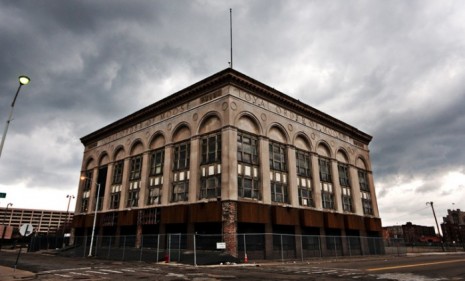Could Detroit disappear?
The population of the Motor City declined by an astonishing 25 percent in the last decade. Could it vanish altogether?

A free daily email with the biggest news stories of the day – and the best features from TheWeek.com
You are now subscribed
Your newsletter sign-up was successful
Any visitor to Detroit can tell the city is wasting away, with vast swaths of empty lots and dilapidated houses across the once-proud metropolis. But new data from the 2010 Census makes it official: The population of the Motor City has plummeted to its lowest point in 100 years. The city lost one-fourth of its residents, about 237,500 people, in the last 10 years — which amounts to about one person every 22 minutes. At this astonishing rate of decline, can Detroit really hope to exist for much longer?
Detroit is doomed: How can Detroit hope to recover from this? asks Douglas A. MacIntyre at 24/7 Wall St. It has almost no tax base, few social services, a threadbare infrastructure, and "no enticements to bring new businesses back to town." It would cost "tens of billions of dollars" to help Detroit — money that the federal government is unable and unwilling to spend. "The city's wastelands will never go away." In time, they may be all that's left.
"As Detroit dies, solutions disappear"
The Week
Escape your echo chamber. Get the facts behind the news, plus analysis from multiple perspectives.

Sign up for The Week's Free Newsletters
From our morning news briefing to a weekly Good News Newsletter, get the best of The Week delivered directly to your inbox.
From our morning news briefing to a weekly Good News Newsletter, get the best of The Week delivered directly to your inbox.
Detroit can survive as a smaller city: There is a solution to Detroit's plight, says an editorial in the Detroit Free Press. We must convince residents to move to areas "that still have solid population bases," produce a "credible plan to abandon the infrastructure in other areas," and give them up to farmland. We are a "fundamentally changed city" now. Time to start acting like one.
Other cities have recovered from disaster: Look on the bright side, says Laura Parker at AOL News. Although Detroit's recovery may "face long odds," cities have bounced back before. Pittsburgh, for example, has reinvented itself as a "healthcare and high technology hub" since the steel industry collapsed. If it can attract a replacement to the depleted auto industry, Detroit could have a future yet.
"Can anything be done to help cities like Detroit?"
A free daily email with the biggest news stories of the day – and the best features from TheWeek.com
-
 Political cartoons for February 16
Political cartoons for February 16Cartoons Monday’s political cartoons include President's Day, a valentine from the Epstein files, and more
-
 Regent Hong Kong: a tranquil haven with a prime waterfront spot
Regent Hong Kong: a tranquil haven with a prime waterfront spotThe Week Recommends The trendy hotel recently underwent an extensive two-year revamp
-
 The problem with diagnosing profound autism
The problem with diagnosing profound autismThe Explainer Experts are reconsidering the idea of autism as a spectrum, which could impact diagnoses and policy making for the condition